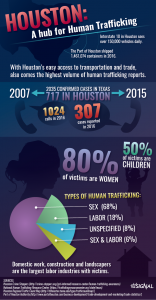Hiding in plain sight: Human trafficking in Houston
Houston is the fourth-largest city in the United States; it is a busy port city, and situations or people can be overlooked because they appear normal, but they may be involved in a very common crime: human trafficking.
Because human trafficking is a crime that easy to hide, it is hard to know the exact number of people or organizations involved. However, Houston has been identified by the National Human Trafficking Resource Center as a hub for human trafficking. Houston produces the most calls to the national hotline in Texas; which is listed as the second state in the U.S. with the highest number of calls. Houston also has easy access to the border and the I-10 highway, which allows people to stop at major cities and seaports.

Infographic created by The Signal Online Editor Sam Savell.
A victim of human trafficking is seen as a commodity, not a person. Victims are usually brought into human trafficking by force, fraud or coercion. There are two forms of human trafficking, sex and labor.
Although sex trafficking receives the most media attention, labor trafficking is actually more common. The Houston Human Trafficking website states that the most “common venues and industries for labor trafficking in Texas include traveling sales crews, domestic work, construction, agriculture and health and beauty services.”
A massage establishment or nail salon could be involved in human trafficking and still appear professional. The Houston Human Trafficking website has a “Know Before You Go” checklist that includes helpful tips on what to look for at salons that offer these services.
Minal Patel Davis, special advisor to Mayor Sylvester Turner on human trafficking and developer of Houston’s first anti-trafficking strategic plan said that one of the reasons for the uncertainty about the number of people involved is that some victims do not know they are victims.
“This is a challenge everybody has including law enforcement because often times victims think that it’s a boyfriend, lover, parent-type figure just doing this to them as a favor and that this person loves them,” Davis said. “So they’re not necessarily going to disclose that easily.”
A key factor in helping victims is by raising awareness. A common misunderstanding about human trafficking is that it is a foreign issue.
“I think that initially when the issue came to light, it came to light in a foreign lens,” Davis said. “When something gets out there with the general public, that’s where their mind stays, and to get them to realize something different about it just takes time. It takes raising awareness, and it takes information.”
One way to help prevent human trafficking is by purchasing products that are not made by victims. Purchasing only Fair Trade products will prevent the demand for labor trafficking from growing. All Fair Trade products have a green and black sticker for customers to easily recognize the certified product.
Another way to help victims is by taking notice if they appear to be under stress outside of their work environment.
“[Different signs of a victim of human trafficking includes], not making eye contact, maybe [they don’t] necessarily speak the language and [they] aren’t comfortable making decisions on their own,” said Timeka Walker, executive director for United Against Human Trafficking. “But, it’s a truly undercover crime. A lot of the time it’s hard to just spot someone and say, ‘oh, they’re a victim’ usually you would have more of a conversation.”
If a person is exhibiting any of these signs, Walker said it is important to immediately call the national human trafficking hotline, 1-888-373-7888.
“They have volunteers there 24 hours a day that speak multiple languages and they will talk you through what you witnessed,” Walker said. “If you see something happening, please call this number and, of course, you can call your local law enforcement as well.”
Another way to help is by attending events that spread awareness about human trafficking. For the past seven to eight years, United Against Human Trafficking holds different events in January, the human trafficking awareness month.
Walker said they are already preparing different activities to occur before the Super Bowl arrives in Houston in February 2017. The demand to have fun during this event causes an increase in online sex ads, which attracts traffickers to travel and make more money.
At UHCL, the Delta Xi Nu Multicultural Sorority is spreading awareness about human trafficking through its Red Sand Project (RSP). The project was created by artist Molly Gochman. At UHCL, students filled the cracks on the sidewalk with red sand and left chalked messages that said, “End the trafficking” and left the national human trafficking hotline phone number.
“Red Sand Project is a participatory artwork that uses sidewalk interventions, earthwork installations and convening to create opportunities for people to question, to connect and to take action against vulnerabilities that can lead to human trafficking and exploitation,” Gochman states on her website.
“The RSP is an attention grabber and informer all at once,” said Jameka Richards, president of the Delta Xi Nu Sorority. “This [human trafficking] is important to UHCL students because anyone can be trafficked, especially international people who are seeking jobs but are not able to work in the U.S. yet. We want all of our fellow UHCL students to be aware of what is happening in our community.”

